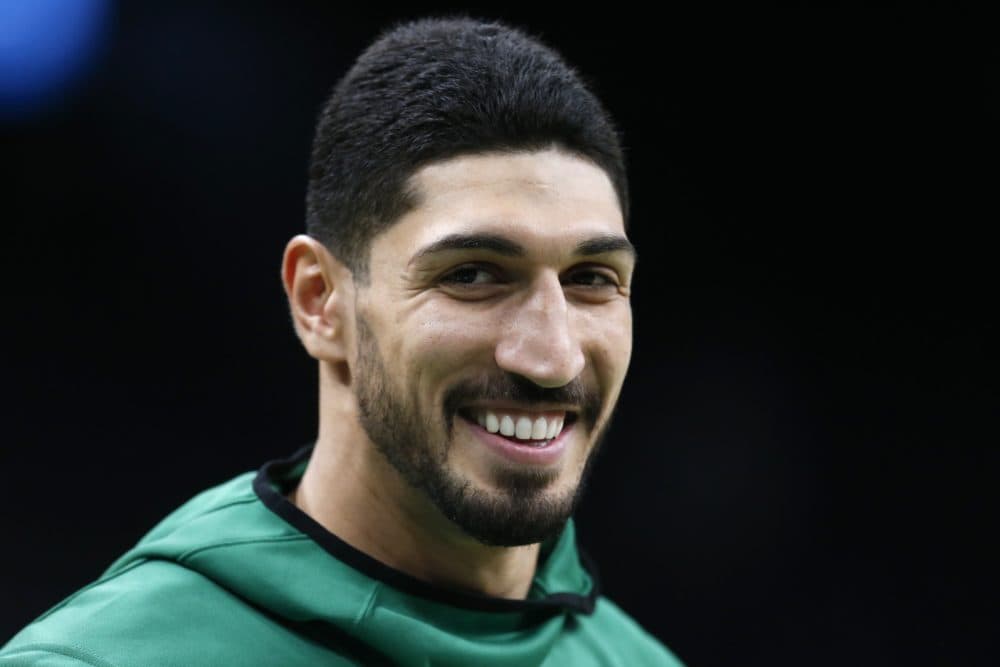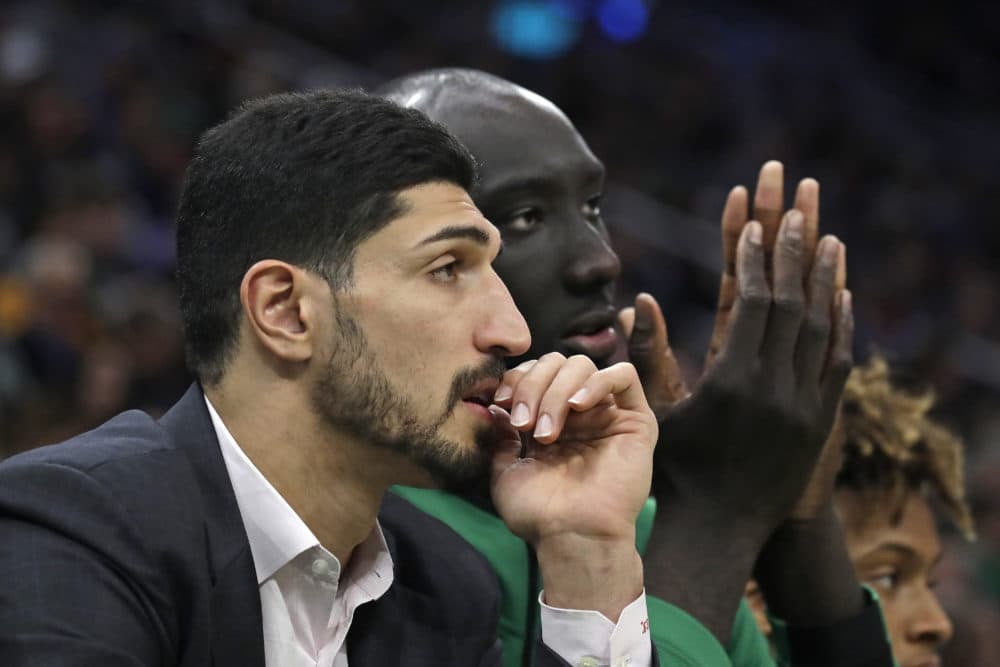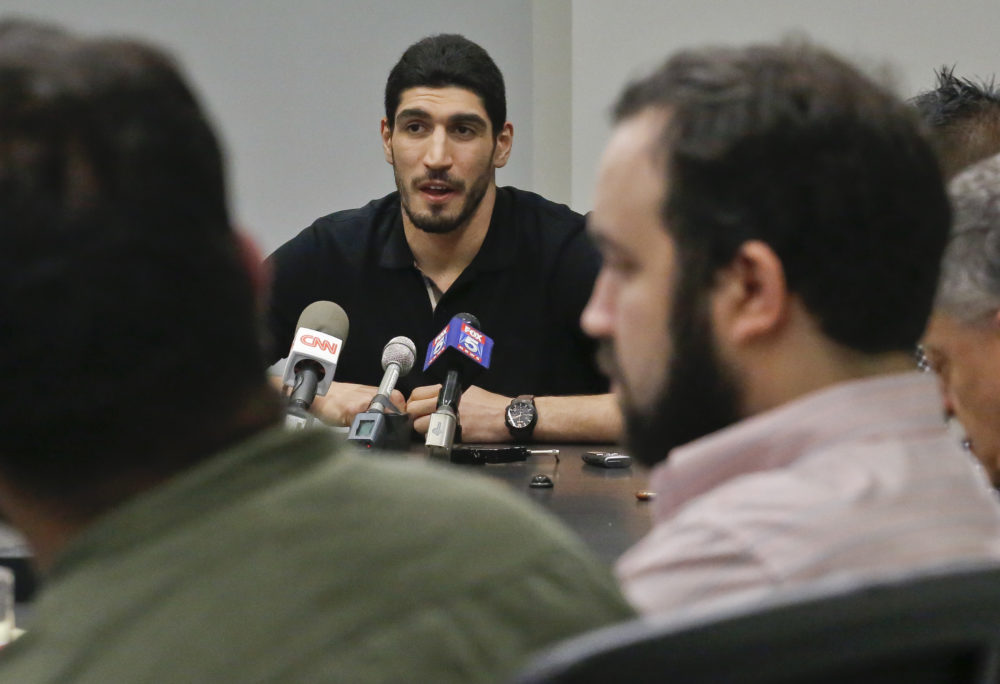Advertisement
Enes Kanter Is Thinking Beyond Basketball
Resume
Enes Kanter isn’t thinking about the Celtics' next game. Instead, he pulls out his cellphone to play a video. It’s a snowball fight with his 7-foot-5 teammate Tacko Fall.
“I will describe myself as NBA player, human rights activist,” he said. “And a snowball fighter, actually. Yeah, you can include that one.”

But underneath Kanter’s easy-going, fun-loving personality is a 6-foot-10-inch NBA center who seizes every opportunity and platform to raise awareness about human rights violations. He’s an outspoken critic of the Turkish government led by President Recep Tayyip Erdogan.
Kanter draws attention to what many see as an increasingly anti-democratic regime. And he does so at great personal risk.
“I've been getting death threats since probably 2015 and '16, and I'm used to them now," Kanter said. “People are asking me if I'm taking them seriously. Of course, you’re going to take them seriously because those are death threats. Doesn't matter where they come from — your phone, your Instagram, Twitter, this and that.
"I used to take like screenshots of them. But it got to a point, it [was] like there's so many. I'm like, ‘I'm not going even bother doing it. I'm just going to leave it alone.’ ”
“I've been getting death threats since probably 2015 and '16, and I'm used to them now."
Enis Kanter
Kanter is part of a growing number of high-profile athletes who've adopted social justice issues and human rights causes.
“When you look at someone like Kanter, he’s even more of a figure considering that he may require asylum,” said ESPN senior writer Howard Bryant. “You don’t say that about a Colin Kaepernick or about a LeBron James or any of those players who simply, by the protection of being in the United States, are able to dissent. He is another step beyond that.”
Just how far beyond became clear in 2016, after a failed military coup in Turkey.
Kanter had been a critic of Erdogan well before the coup, but he played in the NBA and lived in the U.S. After the coup, however, Kanter’s family back in Turkey became a target. His father lost his job, was arrested and spent about a week in jail. His sister couldn’t find work after medical school. His younger brother got kicked off his basketball team.
“So, my family had to put a statement out there and said that we are disowning Enes,” Kanter said. “And they made it publicly.”
Then, in May 2017, Kanter was running basketball camps for kids in Indonesia. His manager woke him in the middle of the night with an urgent message: The Turkish government had told Indonesian authorities that Kanter was dangerous. Now, the Indonesian police were after him.
Kanter rushed to the airport and took the next flight out of the country. He flew from Indonesia to Singapore to Romania. But trouble struck when he arrived at the Bucharest Airport.
“I gave my passport to this lady,” Kanter said. “She looked for five, 10 minutes. She said, ‘Hold on,’ and she went back. She came out and said you guys cannot get in the country because your passport has been revoked.”
While at the Bucharest Airport, Kanter posted a video on Twitter. In the video, Kanter called Erdogan the “Hitler of our century.”
Looking back at what happened, Kanter says, “They could have deported us back to Turkey and that would be the last time you'll hear from me.”
With help from the U.S. government, Kanter made it back to the States, where he learned the Turkish government had issued a warrant for his arrest. Kanter still doesn't have a passport, and, with the warrant, international travel is risky.

The Celtics play in Toronto on Christmas Day. Kanter wants to go. And he’s planning to reach out to a certain Canadian politician for some help.
“I have a phone conversation with Justin Trudeau,” Kanter said. “So, that’s gonna be very exciting.”
Yes, that Justin Trudeau. The prime Minster of Canada.
“So, I’m literally gonna ask, like, ‘Hey, I’m coming to your country. Is it OK for me to come?’ ”
In the U.S., Kanter is well connected to politicians. And he’s adding to the list of causes where athletes believe they can make an impact, according to Bryant.
“So much in the United States, we look at these athletes and, since Ferguson and Trayvon Martin and everything else — whether we’re talking about the NBA or the NFL — we look at it from the standpoint of domestic issues,” Bryant said. “Black, white, police, community. But Enes Kanter is an international figure involved in this. It just raises the ante, once again, that these athletes and their positions and their platforms are so big that we’re looking not only nationally, but geopolitically as well.”
“This is way bigger than basketball because it doesn't just affect me. It affects millions of people.”
Enes Kanter
Kanter might bring that international perspective to D.C. on a more full-time basis.
He plans to get U.S. citizenship. Then, after his playing career, “I’m actually thinking about becoming an American politician. Maybe a senator.”
But one thing will remain the same.
“For me, it’s principles over anything, over business, over money, over endorsement deals,” Kanter said. “This is way bigger than basketball because it doesn't just affect me. It affects millions of people.”
For Kanter, that makes it worth the personal cost.
This segment aired on December 20, 2019.
